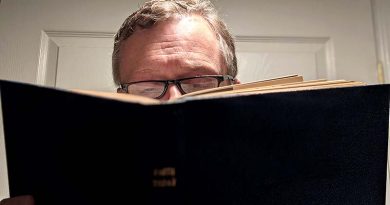Seven for Summer’s Ease
Julie Lane Gay is a writer and editor who lives in Vancouver with her husband Greg and their four children. She attends St John’s, Vancouver.
Liturgy of the Ordinary: Sacred Practices in Everyday Life
Tish Harrison Warren, InterVarsity Press, 2017
I often feel that our culture holds a gravitational pull to live as if God did not exist – that I need to be attentive to the world around me in two languages instead of one. In Liturgy of the Ordinary, Tish Harrison Warren, an Anglican priest in Pittsburgh, invites and guides us to attend to the holy in the ordinary, not to tune out the world, but to see God present and active in the daily. She writes, “Our addiction to stimulation, input and entertainment empties us out [leaving us] unable to embrace the ordinary wonders of life in Christ.”
Warren reflects on losing our keys, answering emails, eating leftovers and sleeping, showing us wonders in all of them. She writes, “Sitting in traffic, stuck, is one of the very few times in my day where I embody the true state of my whole existence – on the way, already but not yet, living as a creature in the in between, waiting.”
Funny and practical, Warren offers scriptural and Prayer Book underpinnings for all that she notices, and suggests. This is not a how-to, but a quiet path to seeing God in the mundane – in all its beauty and its truth.
Everything Happens For a Reason And Other Lies I Have Loved
Kate Bowler, Random House, 2018
Nearly seven years ago, historian Kate Bowler wrote a definitive book on the American Health and Wealth gospel. While she focused on historical observation, Bowler (a native of Winnipeg) shed light on how the theology of the movement is at odds with Scripture. Within months of the book’s release, Bowler was diagnosed with stage IV colon cancer.
To her credit, she quickly saw how she too carried the Health and Wealth gospel’s notion of God within her, seeing its promises colour her own crisis.
She writes from her hospital bed of the pat phrase, “everything happens for a reason.”
“The only thing worse than saying this, is pretending that you know the reason. I’ve had hundreds of people tell me the reason for my cancer. Because of my sin…. Because God is fair. Because God is unfair…. When someone is drowning, the only thing worse than failing to throw them a life preserver is handing them a reason.”
Part memoir, and part social analysis, this is a gem for everyone who sidles into calamity, grief and pastoral care – pretty much all of us.
Carnegie’s Maid
Marie Benedict, Sourcebooks Landmark, 2018
I long to find strong novels amongst a bookstore’s new releases. I can’t quite give up but I am continually put off by their bleak plots and uninspiring characters. Carnegie’s Maid, a work of historical fiction, was handed to me as I was boarding a plane – a flight for which I had nothing to read.
Framed as a journal of a twenty-two-year-old Irish woman, Carnegie’s Maid is Clara’s tale of working in the young tycoon’s household in 1863-1864, desperately trying to earn enough money to help her family save the farm back in Galway.
Clara grumbles at the stench and the pettiness of her employers, but she’s courageous, smart and principled – and I now find that I think of her often. Learning about the twists of Carnegie as he built his industrial empire, and then moved toward philanthropy (especially in founding libraries) was exceptionally interesting – as was the possibility of a young servant girl having an unusual influence
Bill Reimer is the manager, and has been for many years, of Regent College Bookstore, one of North America’s largest surviving theological bookstores. He attends St John’s, Vancouver.
Life Without Lack: Living in the Fullness of Psalm 23
Dallas Willard, Thomas Nelson, 2018
While I have not read a great deal of the writings of Dallas Willard, I do have a vivid memory of being present when he addressed a small gathering of booksellers. He struck me as a person of deep Christian character who had been shaped by a life with Christ. This posthumous publication is a book of devotion and prayer based around Psalm 23. We are called into a life without fear as we meditate slowly on the words of the Psalmist. Originally a set of talks given to a small group of 30, the format makes the teaching of Willard especially accessible. The reader is urged to commit many of the Psalms to heart so that one can pray them during the day in a variety of situations and seek intimacy with God.
Enlightenment Now: The Case for Reason, Science, Humanism and Progress
Steven Pinker, Viking, 2018
In this restatement of the ideals of the enlightenment for the 21st century, Pinker’s thesis is simply that “Enlightenment” has worked. The author defends this project in a 21st century way — with reams of data. He persuasively uses statistics to point out, for example, how rare homicide is in our culture despite its prominent place in the media. Life expectancy worldwide has increased, childhood diseases have been all but vanquished, while there has been a sharp increase in available calories in recent decades and reduced famine conditions as a result. Reason is at the core of these changes, according to Pinker. The institutions of modernity: schools, hospitals, charities, news agencies, democratic governments and charitable organizations are part of this vast movement. Nature itself contains all the needed seeds for the improvement of the human race that results in universal benefits. Pinker does marshal the data that show enormous benefits over time. But from another angle, one can point to the influence of Christianity as being central to these developments, and not least in Canada. A weakness of the book is that it doesn’t really explore this. For Pinker to be correct then the enormous numbers of Christians involved in these “Enlightenment” projects were simply unwitting pawns. This is a very informative book, which is, however, weakened by a narrow reading of developments in recent centuries.
The Spirit of Early Evangelicalism: True Religion in a Modern World
D. Bruce Hindmarsh, Oxford University Press, 2018
A product of the Canadian Prairies, Hindmarsh has with this volume moved to the forefront of historians of the British evangelical experience. The beginnings of the Evangelical Revival in the 1730s coincided with the emergence of an increasingly modern world and with it a turn to religious voluntarism. In such a world evangelicalism prospered and was adept at adapting to modernity. The movement can be seen as a call to devotion (“the one thing needful”) and “real religion” for all believers. But the changes that evangelicalism wrought were vast and went far beyond interior religious experience even if this was at its core. In painting this larger picture, Hindmarsh skillfully shows how evangelicalism interacted with developments in the natural sciences, law and in art. Personal studies of the young George Whitefield, the Wesley brothers and Jonathan Edwards are woven into the narrative. Surely this account of a “flaming evangelical devotion” has much to teach us within our own culture in flux.
The Spirituality of Jane Austen
Paula Hollingsworth, Lion Hudson, 2017
On a recent trip to England I spotted this book on the shelf of a small Christian bookstore in Cambridge. Not having read Austen before, it was time to learn a little of her life and perhaps to dip into her writing. Daughter of an Anglican vicar, Austen does not appear to have been influenced by evangelicalism. But it is nonetheless Hollingsworth’s contention that Christianity shaped her world and led to a quiet belief that the practice of one’s faith applied to all of life, including family bonds and relations with one’s neighbours. The inner world of faith was more important than outward shows of religiosity. These beliefs are ever present in a close reading of Austen’s writings that constantly “remind the reader of one’s moral responsibilities.” The virtues of constancy, faithfulness, integrity and an awareness of the more negative qualities of “pride” and “prejudice” within the late eighteenth century English world, so helpfully sketched by Hindmarsh, are linked to a developing Christian spirituality. While Austen does rightfully criticize the misuse of power within the church in her novels, she affirms Christian forgiveness and the importance of inward Christian character as opposed to mere outward appearance. Included is a survey of Austen’s life and writings. TAP




